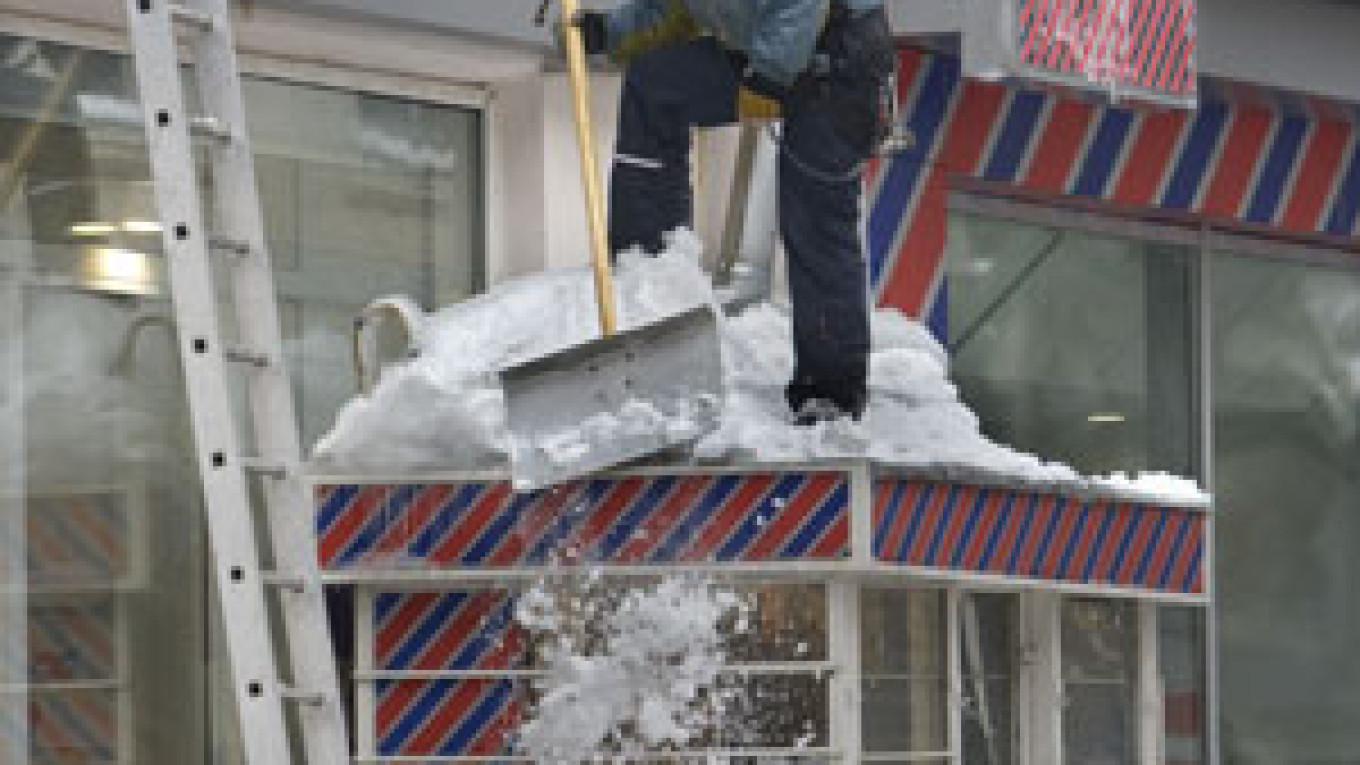Mayor Yury Luzhkov's pie-in-the-sky proposal last fall to blast the winter snow out of the clouds looks more like a pie in the face this week.
By Wednesday, city workers had cleared an unprecedented 17.5 million cubic meters of snow from Moscow's streets from the start of winter, far surpassing the 10.5 million cubic meters of snow collected all of last winter, City Hall said.
"Workers will not slow down their work until the sidewalks are as clean as the streets," said Marina Orlova, spokeswoman for City Hall’s department for public works and utilities.
Moscow has been working overtime to clear streets, sidewalks and courtyards after an all-time record 67 centimeters of snow blanketed the city during the extended holiday weekend. The heavy snowfall broke the last record of 65 centimeters set in 1966.
It wasn't supposed to come to this. Luzhkov, the long-serving mayor who likes to play God with the weather, suggested in September that a way to make the cold months easier on Muscovites would be to expand technology used to fight rain to include the snowdrifts that snarl traffic every winter.
Luzhkov is a long-time proponent of fighting rain by sending up planes to spray clouds with liquid nitrogen, silver, cement particles or carbon dioxide, forcing precipitation to fall before it can reach the capital and spoil holidays like Victory Day in May and City Day in September.
The snow prevention program won quick support within City Hall, with Andrei Tsybin, head of City Hall’s department for public works and utilities, saying in October that the city could save about 300 million rubles ($10 million) by implementing it this winter.
Orlova, spokeswoman for his department, referred an inquiry about Luzhkov's snow prevention plans to the spokesman for City Hall’s municipal services department, Igor Pergamenshchik, who said he was unaware of what had happened to them.
Boris Koloskov, deputy head of the Agency of Atmospheric Technologies with the Federal Agency for Hydrometeorology and Monitoring of the Environment, said his agency has proposed to City Hall that an experiment in dispersing snow clouds be carried out this winter but has not yet received a reply.
It remains unclear whether the chemicals used to fight rain would work against snow. Eduard Kruglyakov, who chairs a commission against bogus science at the Russian Academy of Sciences, said silver particles were too expensive to use to disperse clouds regularly. He could not comment on the effectiveness of liquid nitrogen, cement particles or carbon dioxide.
City Hall also tried a new approach against rain clouds in October, testing an invention called a Chizhevsky Lamp, which is supposed to disperse rain clouds by lifting them high in the atmosphere with a stream of ions. The Moscow Committee for Science and Technologies, a public corporation affiliated with City Hall that conducted the test, declared partial success at the time because the lamp managed to clear a limited area of rain clouds for a short period of time.
St. Petersburg Governor Valentina Matviyenko has also weighed in on using new technologies to grapple with the cold. Earlier this month she suggested removing icicles from roofs with the help of a laser.
A Message from The Moscow Times:
Dear readers,
We are facing unprecedented challenges. Russia's Prosecutor General's Office has designated The Moscow Times as an "undesirable" organization, criminalizing our work and putting our staff at risk of prosecution. This follows our earlier unjust labeling as a "foreign agent."
These actions are direct attempts to silence independent journalism in Russia. The authorities claim our work "discredits the decisions of the Russian leadership." We see things differently: we strive to provide accurate, unbiased reporting on Russia.
We, the journalists of The Moscow Times, refuse to be silenced. But to continue our work, we need your help.
Your support, no matter how small, makes a world of difference. If you can, please support us monthly starting from just $2. It's quick to set up, and every contribution makes a significant impact.
By supporting The Moscow Times, you're defending open, independent journalism in the face of repression. Thank you for standing with us.
Remind me later.


